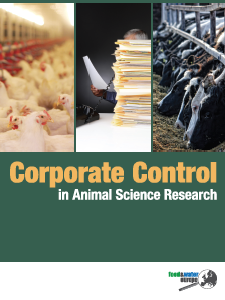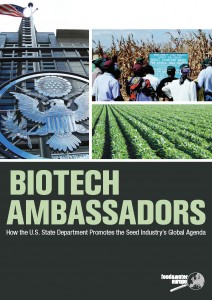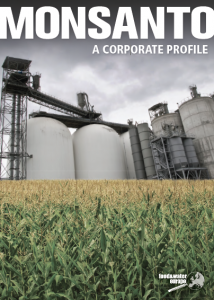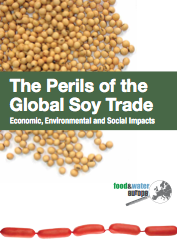En Espagnol
Brussels and Madrid – While European decision makers argue over approving new genetically modified (GM) crops, a Spanish alliance of farmers and environmentalists led by Food & Water Europe demanded radical change in the European Union’s GM cultivation policy. The alliance says the results of a survey of organic farmers in the U.S. shows widespread GM contamination, proving that GM “coexistence” has failed and that the resulting costs and extra work are carried by non-GM farmers. [1] This is a clear warning for Spain, the only EU country growing GM crops on a large scale and where there are likely to be more GM crops soon if approvals in the pipeline for new GM maize varieties come through.
“The situation in the U.S. should be a clear warning for Spain and the rest of the EU not to make the same mistakes,” said David Sánchez, campaign officer at Food & Water Europe. “So-called ‘coexistence’ as promoted by the GM industry is simply impossible, as farmers in both the U.S. and Spain already know.”
The survey, published first in the U.S. by Food & Water Watch and the Organic Farmers’ Agency for Relationship Marketing [2] and released today in Europe, documents the added burden organic and non-GM farmers face, including the increased costs of trying to prevent contamination, extra labour, longer hours and financial insecurity due to economic losses when contamination occurs. The survey shows:
- Economic costs of preventive measures to avoid GMOs can reach more than €6,119 (US$8,500) per year, including buffer zones, delaying planting and testing among others.
- One out of three responding farmers have dealt with GMO contamination in their farm. They reported a median cost of €3,240 (US$4,500). Of those contaminated farmers, over half have had crops rejected by their buyers.
- Other consequences include abandoning crops with GM varieties approved or strained relations between neighbours.
“Farmers in Spain are already facing the same insecurity and lack of legal protection as U.S. colleagues, even though there is only one GM crop approved in the EU. Preventive measures and their costs should not be carried by the farmers that chose not to grow GMOs,” said Andoni García, member of the board of the Spanish Coordination of Farmers (COAG).
The Spanish organic cattle industry is also seriously affected by GM contamination. Forced to import maize from other countries that do not grow GM crops, farmers need to pay extra costs to guarantee GM-free feed. [3]
Considering the situation in the U.S., the COAG, Ecologistas en Acción, Friends of the Earth Spain and Food & Water Europe demand European authorities, including the Spanish Government, reverse current GMO crop policy.
“Organic farming is a growing sector that creates employment and puts new energies in rural areas. Protecting its development means we urgently need to stop growing GM crops in Spain. We cannot be the back door for GM crops into Europe any longer,” added Blanca G. Ruibal, food and farming campaigner at Friends of the Earth Spain.
For more information:
David Sánchez, Campaign Officer, Food & Water Europe +32 485842604
Andoni García Arriola, member of the board of COAG, +34 636 451 569
Blanca G. Ruibal, Food Campaigner, Friends of the Earth Spain, +34 691471389
Gabriela Vázquez, spokesperson, Ecologistas en Acción, +34 635 170495
Notes
[1] The report “Organic Farmers Pay the Price for GMO Contamination “ (“Los agricultores ecológicos pagan el precio de la contaminación por transgénicos”) can be downloaded in Spanish and English.
[2] Food & Water Europe is the European program of Food & Water Watch, a nonprofit consumer organization based in the United States that works to ensure the food, water and fish we consume is safe, accessible and sustainable. So we can all enjoy and trust in what we eat and drink, we help people take charge of where their food comes from, keep clean, affordable, public tap water flowing freely to our homes, protect the environmental quality of oceans, force government to do its job protecting citizens, and educate about the importance of keeping shared resources under public control. http://www.foodandwatereurope.org/europe/
Organic Farmers’ Agency for Relationship Marketing is a cooperative incorporated in the State of Minnesota as a marketing-agency-in-common to support organic producer and their group marketing efforts through cooperatives and farmer association. Current efforts include organic grain, livestock and dairy. Member associations/cooperatives have organic producer members in 18 states from Montana to Texas to Tennessee to Ohio and Michigan and all states in between. www.ofarm.coop
[3] Questionnaire about the socio-economic implications of the placing on the market of GMOs for cultivation. A diagnosis by Spanish organizations: COAG, Ecologistas en Acción, Friends of the Earth Spain, Greenpeace and CECU
www.eurovia.org/IMG/doc/COAG_Socio-Economic_Report_EN-2.doc






